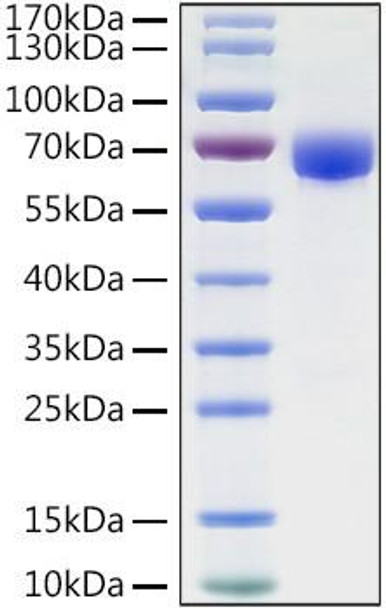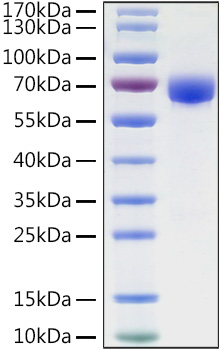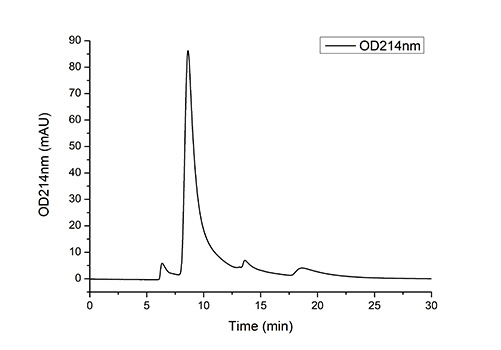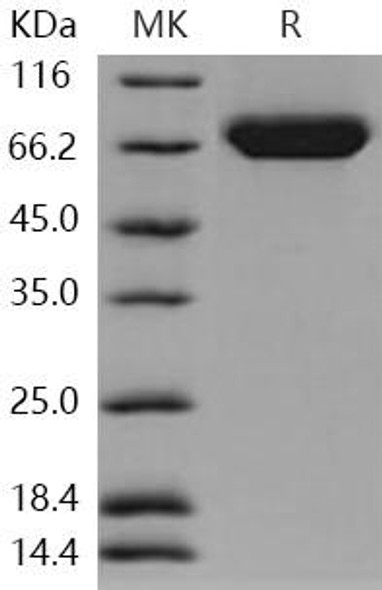Description
Recombinant Human B7-H3/CD276 Protein
The Recombinant Human B7-H3/CD276 Protein is a biologically active recombinant protein that plays a significant role in various cellular processes and signaling pathways in human biology. This protein is widely employed in immunological research, cell biology studies, protein-protein interaction analyses, and therapeutic development, providing researchers with a reliable tool for investigating B7-H3/CD276 function and its implications in health and disease.
This product (SKU: RPCB1128) is produced using HEK293 cells and features a C-hFc&His tag for convenient detection and purification. The protein exhibits a calculated molecular weight of 50.00 kDa with an observed molecular weight of 63-70 kDa under denaturing conditions, achieving ≥ 95 % as determined by SDS-PAGE;≥ 90 % as determined by HPLC.. Functional bioactivity has been validated through rigorous quality control assays, confirming its suitability for demanding research applications.
Key Features
| High Purity by Affinity Chromatography | |
| Mammalian & Bacterial Expression Systems | |
| High lot-to-lot consistency via strict QC |
| Product Name: | Recombinant Human B7-H3/CD276 Protein |
| SKU: | RPCB1128 |
| Size: | 10 μg , 20 μg , 50 μg , 100 μg |
| Reactivity: | Human |
| Synonyms: | CD276, 4Ig-B7-H3, B7-H3, B7H3, B7RP-2, CD276 antigen, 4Ig-B7-H3, B7-H3, B7H3, B7RP-2 |
| Tag: | C-hFc&His |
| Expression Host: | HEK293 cells |
| Calculated MW: | 50.00 kDa |
| Observed MW: | 63-70 kDa |
| Gene ID: | 80381 |
| Protein Description: | High quality, high purity and low endotoxin recombinant Recombinant Human B7-H3/CD276 Protein (RPCB1128), tested reactivity in HEK293 cells and has been validated in SDS-PAGE.100% guaranteed. |
| Endotoxin: | < 0.1 EU/μg of the protein by LAL method. |
| Purity: | ≥ 95 % as determined by SDS-PAGE;≥ 90 % as determined by HPLC. |
| Formulation: | Lyophilized from a 0.22 μm filtered solution of PBS, pH 7.4. |
| Bio-Activity: | Measured by its binding ability in a functional ELISA. Immobilized Human CD276 at 2μg/mL (100 μL/well) can bind CD276 Rabbit pAb with a linear range of 0.1-152 ng/mL. |
| Reconstitution: | Centrifuge the vial before opening. Reconstitute to a concentration of 0.1-0.5 mg/mL in sterile distilled water. Avoid vortex or vigorously pipetting the protein. For long term storage, it is recommended to add a carrier protein or stablizer (e.g. 0.1% BSA, 5% HSA, 10% FBS or 5% Trehalose), and aliquot the reconstituted protein solution to minimize free-thaw cycles. |
| Storage: | Store at -20℃.Store the lyophilized protein at -20℃ to -80 ℃ up to 1 year from the date of receipt. After reconstitution, the protein solution is stable at -20℃ for 3 months, at 2-8℃ for up to 1 week. |
B7 homolog 3 (B7-H3), a member of the immunoglobulin superfamily, is also known CD276, which contains two Ig-like C2-type (immunoglobulin-like) domains and two Ig-like V-type (immunoglobulin-like) domains.B7-H3 may play an important role in muscle-immune interactions, providing further evidence of the active role of muscle cells in local immunoregulatory processes. B7-H3 is a novel protein structurally related to the B7 family of ligands by the presence of a single set of immunoglobulin-V-like and immunoglobulin-C-like (VC) domains. Previous studies have correlated its overexpression with poor prognosis and decreased tumor-infiltrating lymphocytes in various carcinomas including uterine endometrioid carcinomas, and mounting evidence supports an immuno-inhibitory role in ovarian cancer prognosis. Recently, B7-H3 expression has been reported in several human cancers indicating an additional function of B7-H3 as a regulator of antitumor immunity.








